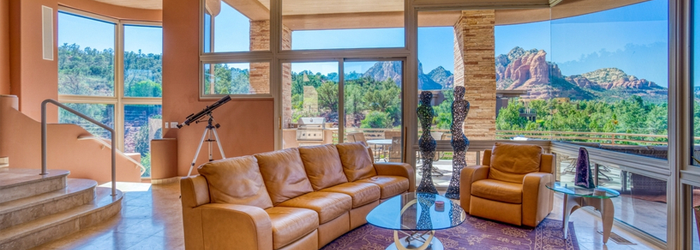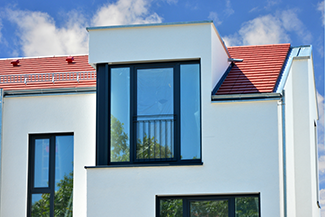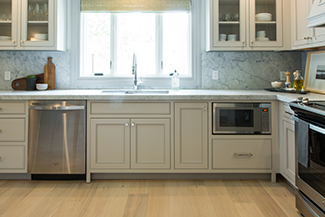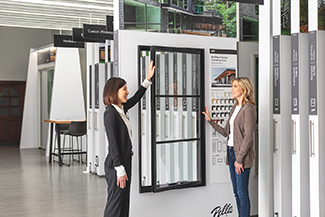Vinyl vs. Fiberglass Windows: Which Is The Better Choice Of Replacement Window?
 17 May 2022
17 May 2022 

Which is the better choice of replacement window - Vinyl or Fiberglass?
Replacing windows in your home is no small decision, and the choice of materials used in the window frame and sashes have a powerful impact on the price you’ll pay and how long they will last.
Two of the most popular choices are vinyl and fiberglass windows. “We often find ourselves comparing the pros and cons of each, so that our customers have enough information to make a decision, but hands down, fiberglass replacement windows are our top choice,” says Sal Sucato, owner at DunRite Windows & Doors, a Rosie-Certified Partner.
It’s not always the right choice for every homeowner, though there are key differences to each material that can determine which one is the best choice for your home.
Budget, the size and shape of the windows, and other factors such as how long the homeowner intends to stay in the home, and how important color and hardware are to them can also influence the decision.
Let’s take a look.
Vinyl is less expensive.
 There's a reason vinyl windows are the most popular choice in America. They're cost-effective and can last more than 30 years, if it’s a good quality window. They also come in a decent array of colors, options, and upgrades. They're an economical choice that can cost upwards of 20% to 30% less than fiberglass.
There's a reason vinyl windows are the most popular choice in America. They're cost-effective and can last more than 30 years, if it’s a good quality window. They also come in a decent array of colors, options, and upgrades. They're an economical choice that can cost upwards of 20% to 30% less than fiberglass.
Why do they cost less? It’s not just about the cost of the raw materials, it’s about the manufacturing process, too. Fiberglass windows are more laborious; hence, they cost more to manufacture. Corners use a hidden fastener to hold the frame together that is installed by hand using glue and screws. This and other aspects of manufacturing a fiberglass window take time and labor. In contrast, vinyl is extruded with the corners melted (welded) together by a machine. It’s a fast, easy product to produce.
You get what you pay for, though, with a great window. A high-quality window will have a thin frame and maximum glass, which offers the most view and natural light. Plus, you can have a wood-style texture on fiberglass, which complements some homes beautifully, or you can choose to have a different color on the interior versus the exterior. This can truly enhance your décor, especially if you choose a white interior and black exterior, which is currently one of the most popular color combinations.
Fiberglass is easy to paint, too, which is helpful if you decide to change the exterior colors of your home as time goes by. Vinyl doesn’t hold on to paint and it voids the warranty. Repainting can be a choice or necessity, depending on the product you purchase. For example, Pella’s Impervia line of fiberglass windows has a power coat finish that Pella claims never needs painting or refinishing … something every homeowner is sure to appreciate.
Fiberglass lasts longer.
“If a homeowner intends to remain in their home for a long period of time, fiberglass is the better choice,” says Sucato. “It can last upwards of 50 years, compared to the 20 to 30 years you’ll get from a good quality vinyl window.”
If you’re the type of homeowner that rarely stays in a home longer than a decade, Sucato recommends not spending the extra money on fiberglass unless you simply prefer the look. He predicts that you won’t recoup the investment before you leave.
However, if it’s your forever home or one that you hope to pass down to your children, then it might be worth a closer look.
Fiberglass is more energy efficient.

While vinyl windows are far more energy-efficient than aluminum windows, fiberglass windows have them beat. Fiberglass is made from a mat of finely spun glass fibers, mixed with a polyester resin, versus a vinyl window that’s made from PVC (polyvinyl chloride). It’s less likely to retain heat or conduct it through the frame to the inside of the home. According to The Spruce, it’s rated 15% higher than vinyl windows, when it comes to R-value, which is how well a window slows the rate of heat transfer.
Fiberglass frames can be hollow or insulated, which impacts the overall energy efficiency of the window, along with other features such as the number of low-E glass coatings, gas fill between the panes of glass, and the number of glass panes in the window.
Vinyl comes in more colors and shapes.
Not only do fewer manufacturers make fiberglass windows, compared to the plethora of vinyl options available, but fiberglass can also be very difficult to order in specialty shapes—although the Pella® Reserve product line does have an arched window shape.
Fiberglass is also more expensive than the same specialty shape in a vinyl replacement window. This is often why some homeowners choose vinyl instead of fiberglass windows, or why they choose to install a different brand and/or material of window for that one specialty shape, but not the others.
“I will say this about fiberglass windows in specialty shapes; when you can find the perfect size at the right price, a fiberglass specialty window is far stronger than a comparable vinyl window. Their structural strength is impressive. You’ll also appreciate that it has a thinner frame than the vinyl,” Sucato states. “This can be something to think about.”
Fiberglass doesn’t shrink or expand with the weather.
Vinyl and fiberglass windows are both weather-resistant, so the frame itself won't have moisture issues from rain or humidity. They also won’t rot, rust, warp, or bubble from the heat.
However, fiberglass does have one advantage over vinyl when it comes to the weather: it doesn't expand in the hot summer or contract during the cold winter. All other window materials do, which can lead to gaps and air leaks, or opportunities for moisture and insects to enter the walls around the window opening. Even if the weather changes are extreme, fiberglass is impervious.
Fiberglass is basically the same material as the panes of glass, so they complement each other in whatever minimal changes happen.
This lack of thermal movement is the primary reason why a fiberglass window has such a long lifespan. Vinyl windows eventually lose their resiliency over time, becoming brittle, which leads to damage when the window expands or contracts. Fiberglass that's thirty, forty, or even fifty years old is just as strong as the day it was installed.
“Because fiberglass windows are rigid, they are less forgiving to install than a vinyl window, which has a bit of flex to it,” says Sucato. “Therefore, it’s critical that they are installed correctly. It’s just one reason why DunRite offers a lifetime installation guarantee for as long as the purchaser owns the home. We stand behind the quality of our workmanship, so you know it’s a job done right.”
Both have very little maintenance.
When it comes to the amount of effort required by the homeowner to maintain their windows, vinyl vs. fiberglass comes out fairly equal.
Other than replacing the caulking or sealant when necessary, and keeping the glass clean and the weep holes open (which Sucato recommends doing before summer arrives), there is very little maintenance to be done.
Both have finishes that last for the life of the window, although some painted fiberglass or vinyl windows may need to be repainted occasionally, depending on if it's factory paint or not, and the expected lifespan of the paint.
Be sure to discuss all of your options.
 No matter which direction you’re leaning -- vinyl vs. fiberglass windows, it's important to discuss your specific budget, preferred styles, colors, and other options with the salesperson as you obtain price estimates for your replacement windows. They can help you make an educated decision that's right for your home. Just remember that a salesperson selling only one brand or product line can only recommend what they sell, so if you’re thinking about fiberglass windows, Sucato encourages you to make sure they sell fiberglass products, as well as vinyl. They’ll have the experience and product knowledge to discuss the pros and cons.
No matter which direction you’re leaning -- vinyl vs. fiberglass windows, it's important to discuss your specific budget, preferred styles, colors, and other options with the salesperson as you obtain price estimates for your replacement windows. They can help you make an educated decision that's right for your home. Just remember that a salesperson selling only one brand or product line can only recommend what they sell, so if you’re thinking about fiberglass windows, Sucato encourages you to make sure they sell fiberglass products, as well as vinyl. They’ll have the experience and product knowledge to discuss the pros and cons.
A Special Note From Rosie: Long-time ROTH listeners and/or readers, have heard my concerns about vinyl windows and doors. My sentiments go back to their introduction years ago when the early generations of vinyl products justified my concern. Today, modern technology improvements from certain manufacturers combined with the right installation experience can make them a viable option. I trust DunRite, and you can have confidence in their product recommendations.
Rosie Special: Call and mention Rosie on the House and DunRite will offer you a special discount.
###
Podcast
Special Guest the Legendary Announcer For The Phoenix Suns Al McCoy joins the broadcast to talk about the Suns playoff season and highlights of his 50 years of broadcasting Suns games. Sal Sucato of DunRite Windows & Doors details the pros and cons of vinyl and fiberglass windows. What windows give you more bang for your buck!
SPONSORED BY DunRite Windows & Doors
 Founded in 2001, DunRite Windows & Doors is a family-owned business that installs products from the top window and door manufacturers carefully screened for their quality and warranties, including Andersen, Thermatru, Milgard, Pella, Anlin, Masonite, and more. Double-pane windows to ceiling-height, big sliding glass doors - DunRite offers a wide variety of replacement options, backed with a Rosie-approved reputation for five-star service, great prices, and a smooth, hassle-free experience!
Founded in 2001, DunRite Windows & Doors is a family-owned business that installs products from the top window and door manufacturers carefully screened for their quality and warranties, including Andersen, Thermatru, Milgard, Pella, Anlin, Masonite, and more. Double-pane windows to ceiling-height, big sliding glass doors - DunRite offers a wide variety of replacement options, backed with a Rosie-approved reputation for five-star service, great prices, and a smooth, hassle-free experience!
Photo Credit
- Pella
- Shutterstock
RELATED CONTENT
- Blog: Shopping For Windows? Choose The Right Upgrade.
- Blog: How to Prepare Your Home’s Windows for Summer
- Blog: Know The Cost of Maintaining Your Home
- Blog: The Order of Your Remodel Will Determine The Outcome
- DIY FAQ: Budgeting For Home Maintenance
- DIY FAQ: Planning For Annual Maintenance And Home Projects
- DIY FAQ: Maintain Proper Air Supply By Regularly Changing The Filter
- DIY FAQ: Don't Wait Until May To Schedule Your AC Tune-Up
- DIY FAQ: Managing Your Home In The Digital Age
- DIY FAQ: When To Service Garage Your Door
- DIY FAQ: Overseeding Your Lawn
- DIY FAQ: What's Monsoon Weather & How Do I Prepare for It?
Print this page
recent post
- Duck, Duck, Duct! How Often Should Ductwork Be Cleaned?
- Vinyl vs. Fiberglass Windows: Which Is The Better Choice Of Replacement Window?
- We May Be The Grand Canyon State, But The Rocky Mountains Are Important For Arizona
- Welcome to Arizona! Things A Newbie to Arizona Should Know
- The Pros & Cons of Buying A Flipped House
- Getting In On The Ground Floor
- Why It’s More Critical Than Ever To Get Your AC Serviced Before Summer
- The Reality of Remodeling
- What To Look For When Comparing Your Roofing Quotes
- What To Expect When Buying New Windows & Doors
